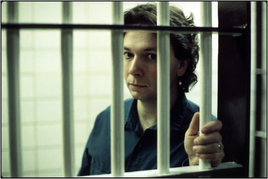|
Unfortunately, it is not unusual for me to visit with someone at the county jail who has been re-incarcerated for a second, third or more times. Often the offenses are small, seemingly foolish, like failing to show up for a required probation or drug court meeting. If they had simply arrived on time at a scheduled meeting they could continue to enjoy their summer instead of spending it behind the bars and concrete block walls of the jail. They have many persuasive reasons for missing the meetings but the bottom line comes down to just following the rules that they so mightily struggle to keep. Human beings have certainly shown their difficulty with obeying those in authority since Adam and Eve failed to keep God’s rule about picking the forbidden fruit of the Tree of Knowledge.
The heartbreak for me is seeing the increasingly serious consequences that these individuals experience. For being lazy, inconsiderate, forgetful, or passive-resistive towards authority, someone can end up serving serious time in a state facility. Because of their nonchalant attitude toward keeping the rules their punishment grows exponentially greater from a few months to a county year to several years in state prison. Often the crime they are in jail for this time may be petty, but their entire history of behavior is considered when sentencing arrives. A consistent rule breaker will find less and less mercy available from the court. Solomon wrote extensively about the choices of foolish human beings in Proverbs. He contrasts that foolish behavior with the choices of those that have learned to listen and obey. One thing becomes abundantly clear – the longer we resist doing the right things in life the more difficult our lives will become. Being imprisoned is a hard lesson. But for every person the truth is that we need to obey God quickly before we reap the difficult consequences of our defiance.
1 Comment
Quite often when visiting with an inmate at a county jail, they tell me I am the only person meeting with them. The truth is that their months or years of active addiction, lying, stealing, and other abuse towards their loved ones have burnt the bridges of family relations. It is understandable that the families have come to the end of their patience and have decided to distance themselves from their troubled son or daughter in a form of “tough love.”
I’ve certainly heard the terminology of “tough love” tossed around quite a bit in the prison ministry setting. As I look in the scriptures to find a Biblical example of tough love I can certainly find stories where individuals or nations have been the recipients of God’s form of tough love. You don’t have to look further than the book of Judges where God’s people, Israel, continuous break His heart and force Him to allow them to experience life without His provision and protection. Their horrendous behavior became a continuous warning for the church in the New Testament (1 Corinthians 10, Hebrews 3 & 4, etc) as well. But the important thing that I see is that throughout their rebellious behavior God never entirely abandons them. He is always looking for their return like the father of the prodigal son (Luke 15:20). Suspecting that his father would at least give him a chance to be a servant in the house contributed to the prodigal’s repentance and return. I realize that sometimes families have had to take out “orders of protection” against their incarcerated loved ones and they have to stay obedient to the law. But when inmates show evidence of committing their lives to God, I would hope that families would give them opportunity for reconciliation. I know that it is hard, boundaries will need to be set, and a plan for rebuilding relations established. I pray that “tough love” can give way to healthy family and godly love once more. Recently I was listening to a eulogy for a military leader who had lost his life while commanding his troops during a battle with enemy insurgents. His fellow soldiers commended him for being a commander “that led from the front” instead of directing a battle safely behind the front lines of combat. I think that describes the difference Paul is referring to between being an instructor and being a father. An instructor can tell you how to do something, but a father is there to show you how it is done. Being an instructor is pretty safe because you can always say that something didn’t work for the one being trained because they just didn’t understand what you meant. However, when you are demonstrating what should be done while working with the trainee, they get to see you while you succeed and when you struggle or fail. Sometimes that can bring embarrassment.
But regardless of the possibility of less than perfect outcomes, the Apostle Paul risked saying, “…imitate me.” I’ve talked to some young married men who are thinking about never becoming a father. They say that they are worried about what kind of world their children would be born into, but I think that they are also judging their capabilities of wisely helping to navigate their children through that challenging world. Considering the world that we are living in, I can’t help but feel that we need more spiritual fathers than ever before – godly men who will “lead from the front.” We need men that are being taught and led by their heavenly Father (2 Corinthians 6:18). These men would be following the Biblical example of godly character and self-sacrifice given by Jesus Christ (1 Peter 2:21). We need men who will risk saying, “…imitate me” as I follow the Lord. Many of our Golden Key Team members do one-on-one mentoring sessions with men and women who are incarcerated. Very often they are saddened by their situations and pledge that this will be their last time behind bars or getting involved with the drugs that landed them in jail. For some, the confinement brings on a true moment of clarity, while others will wipe away their tears and rush back to their old life style as soon as they are released. When it comes to “moments of clarity” there is a big difference between the human realizations that you don’t like what your recent choices have done to you and the conviction to make real change that comes with divine illumination.
The Apostle Paul gives the members of the Corinthian church insight into the difference between worldly sorrow that mainly amounts to regretting that you got caught doing something bad and godly sorrow that brings salvation to your life. Consider some of the results of true divine illumination that he points to:
|




 RSS Feed
RSS Feed